Abstract
An analysis of thermal effects on the facilitative transport of oxygen in skeletal muscle fibers is presented. Steady-state mass and energy transport balances are written and solved analytically or numerically using a finite-difference procedure. It is shown that no significant spatial thermal gradients exist due to internal reactions or bulk conduction effects across a muscle fiber. At typical muscle conditions, it is predicted that increased global temperature reduces the fraction of oxygenated myoglobin, increases local oxygen concentrations, and increases the percentage of oxygen flux attributed to oxy-myoglobin. The maximum supportable oxygen consumption rate, mO2max, is defined as the highest consumption rate sustainable without developing anoxic regions at the center of the fiber. By considering only temperature sensitive effects within fibers, mO2max is found to increase slightly with temperature at low temperatures. This increase is due to thermal effects on the diffusion coefficients as opposed to effects associated with the kinetics of the myoglobin-oxygen reaction. If the simulations include the temperature effect associated with oxygen solubility in blood plasma, mO2max decreases with temperature. A sensitivity analysis was performed by varying the values of relevant parameters. The maximum consumption rate was least affected by parameters associated with the kinetic and equilibrium constants and most affected by the diffusion coefficients and the concentration of myoglobin.
Full text
PDF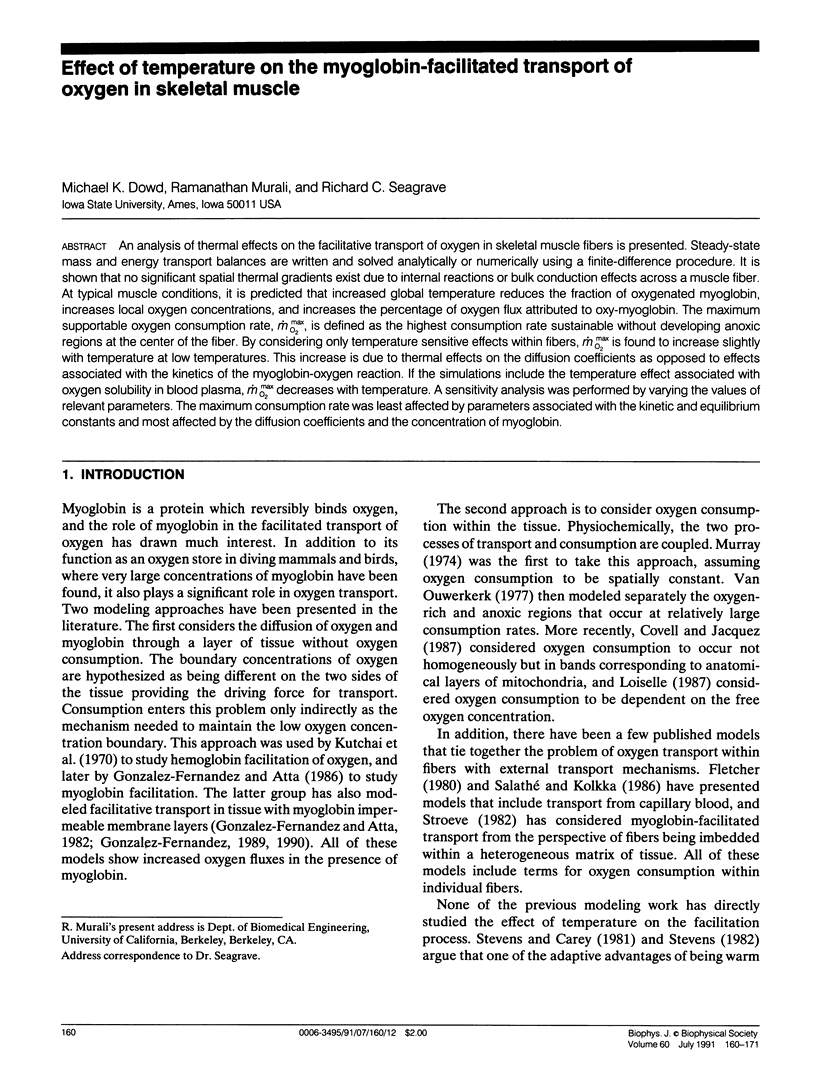
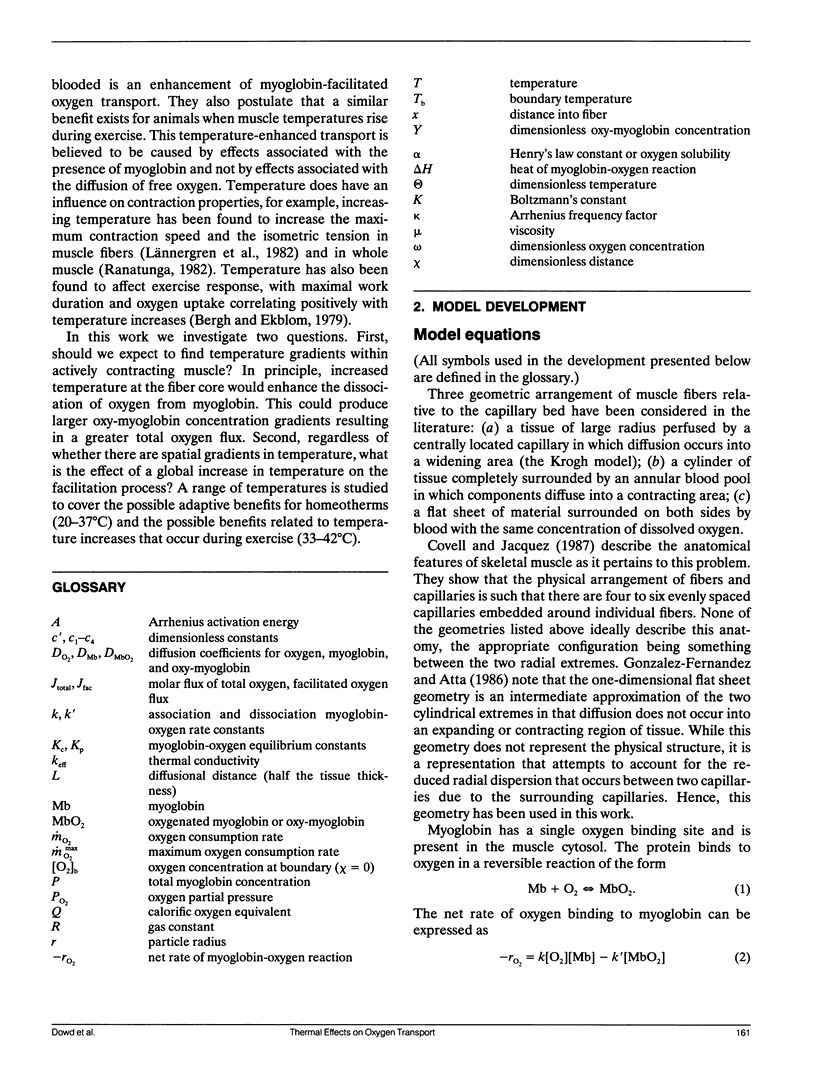
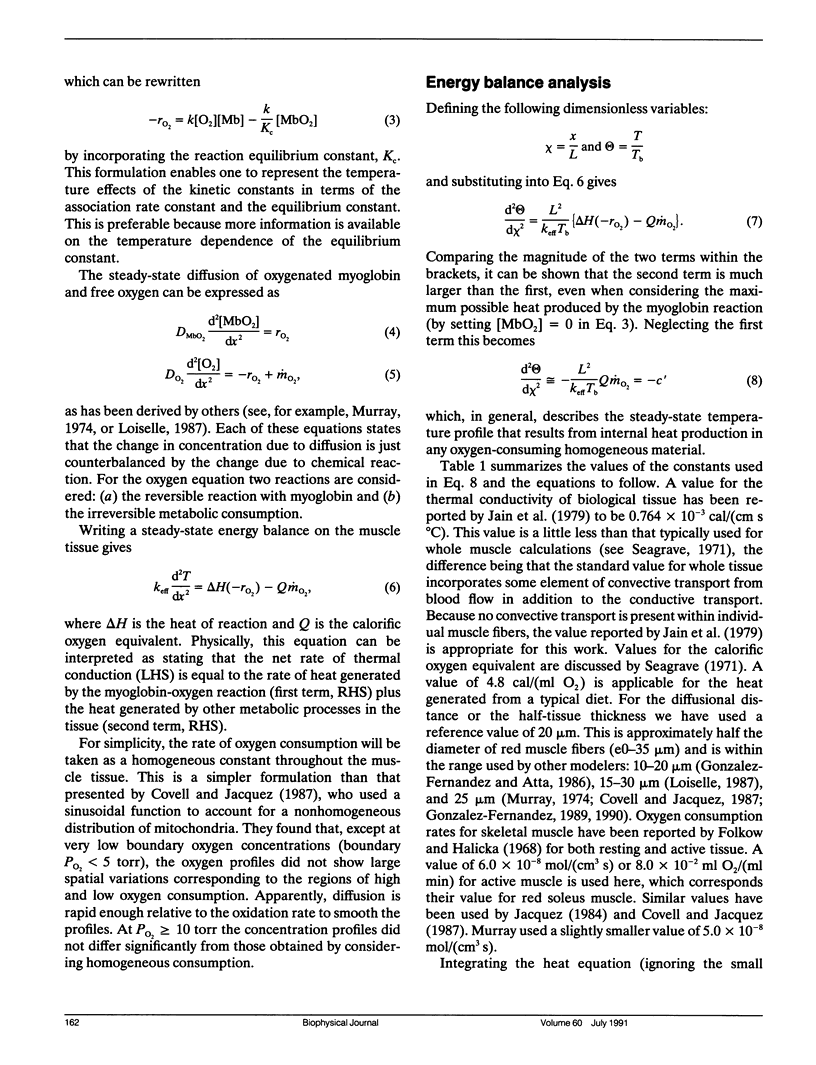
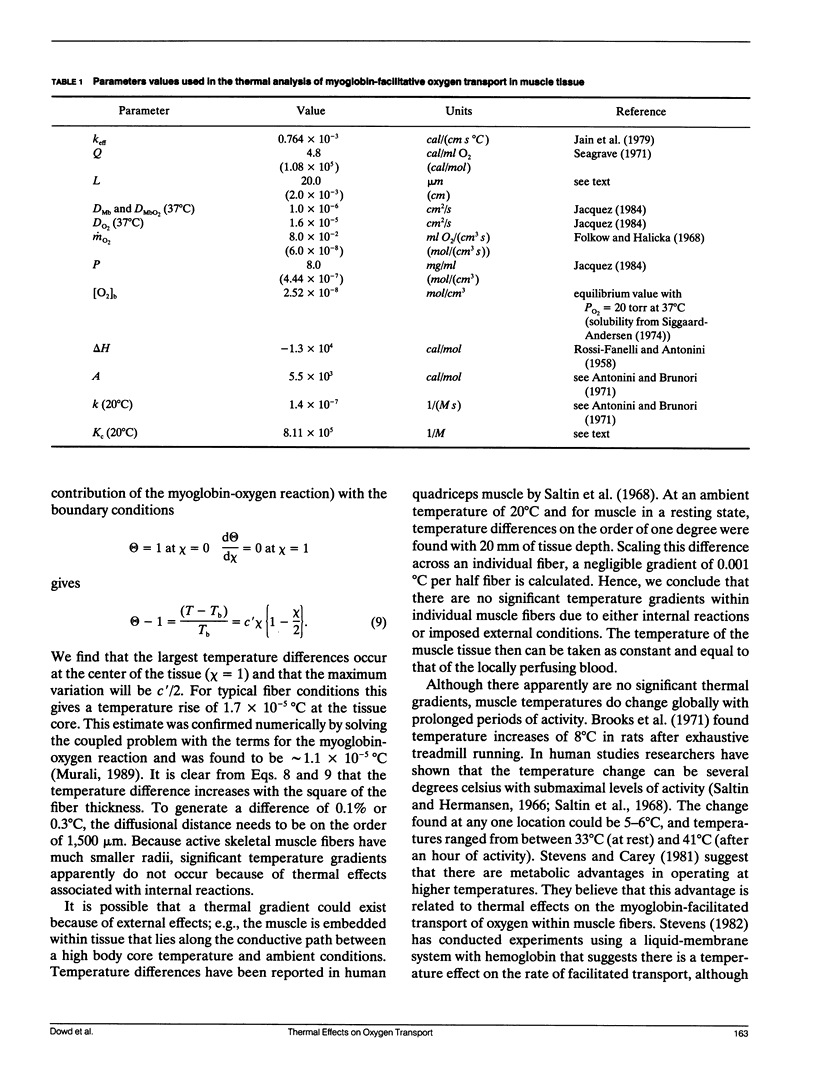
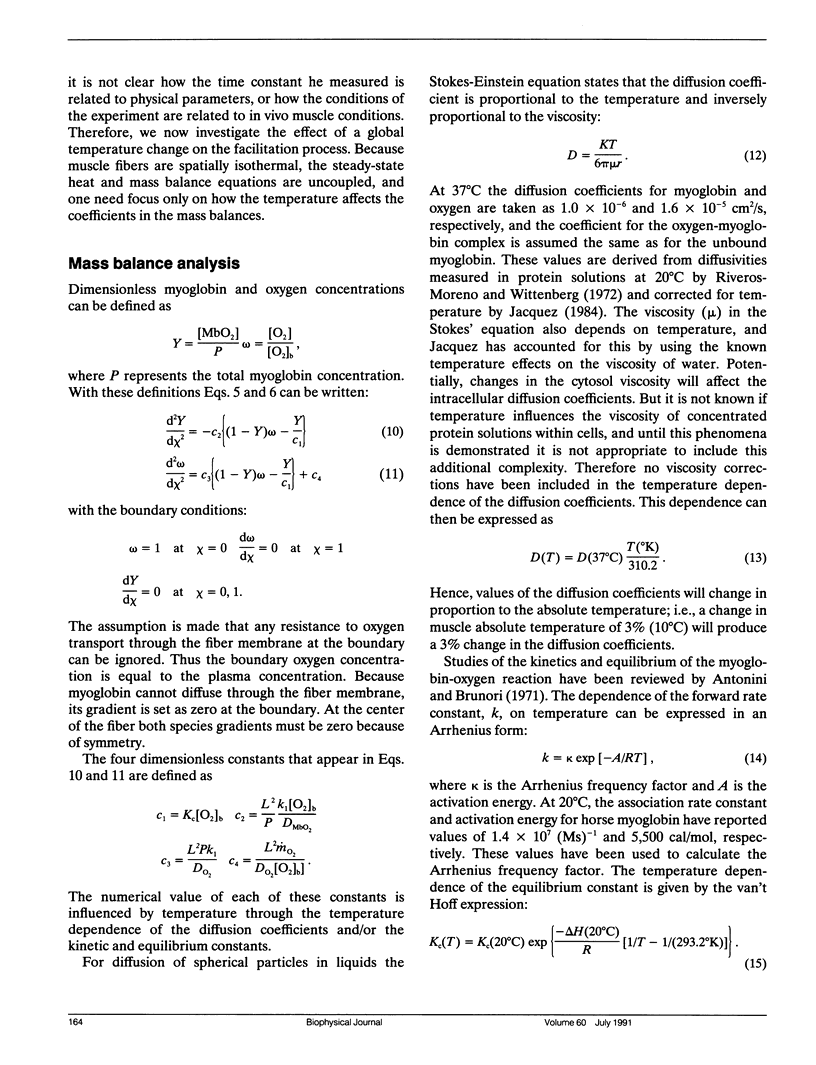
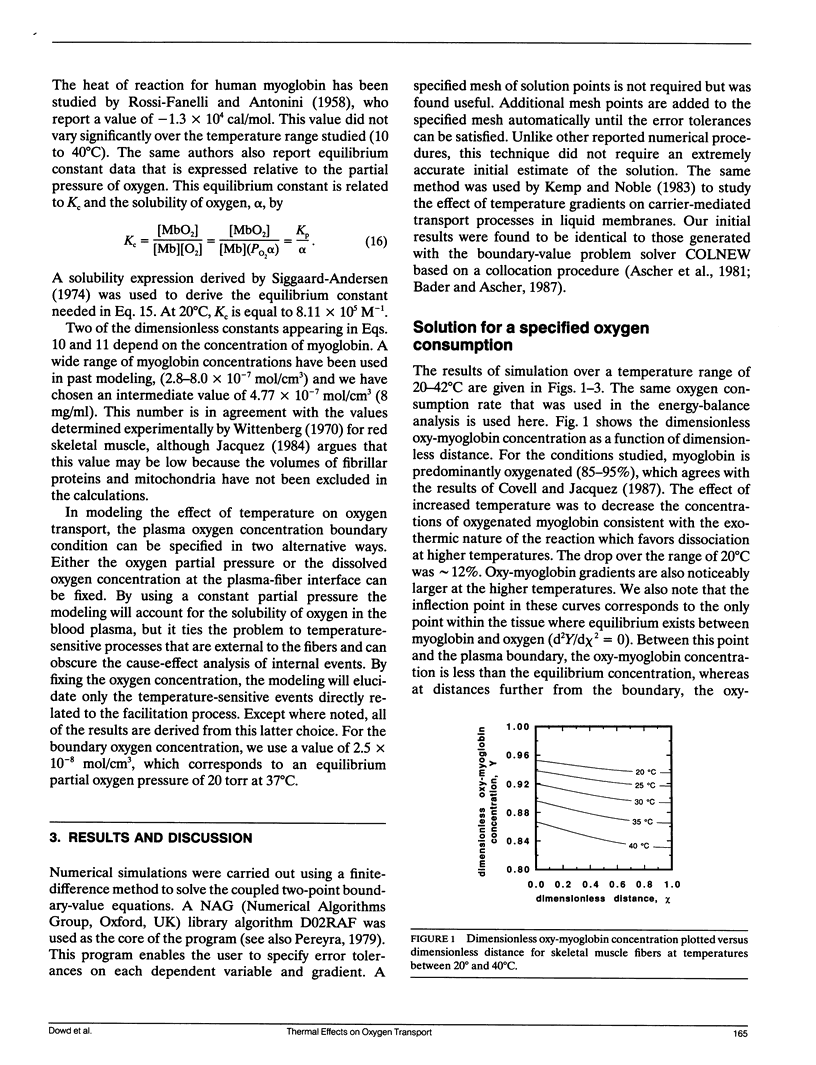
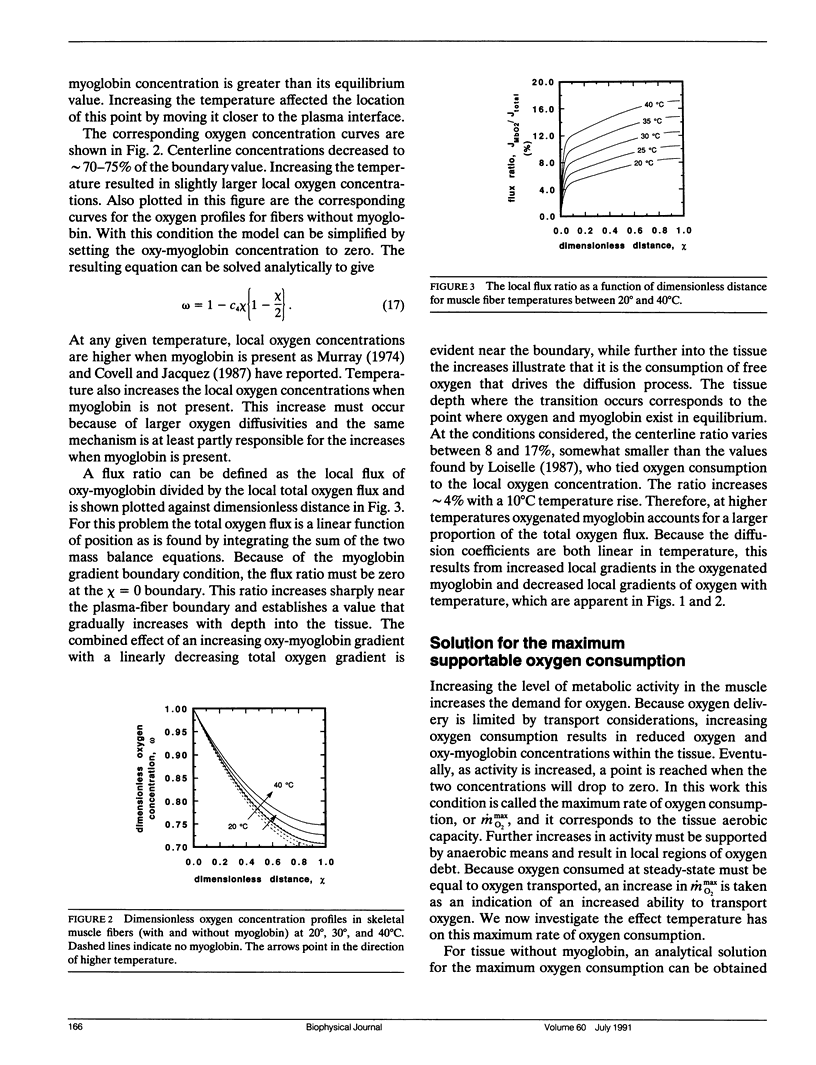
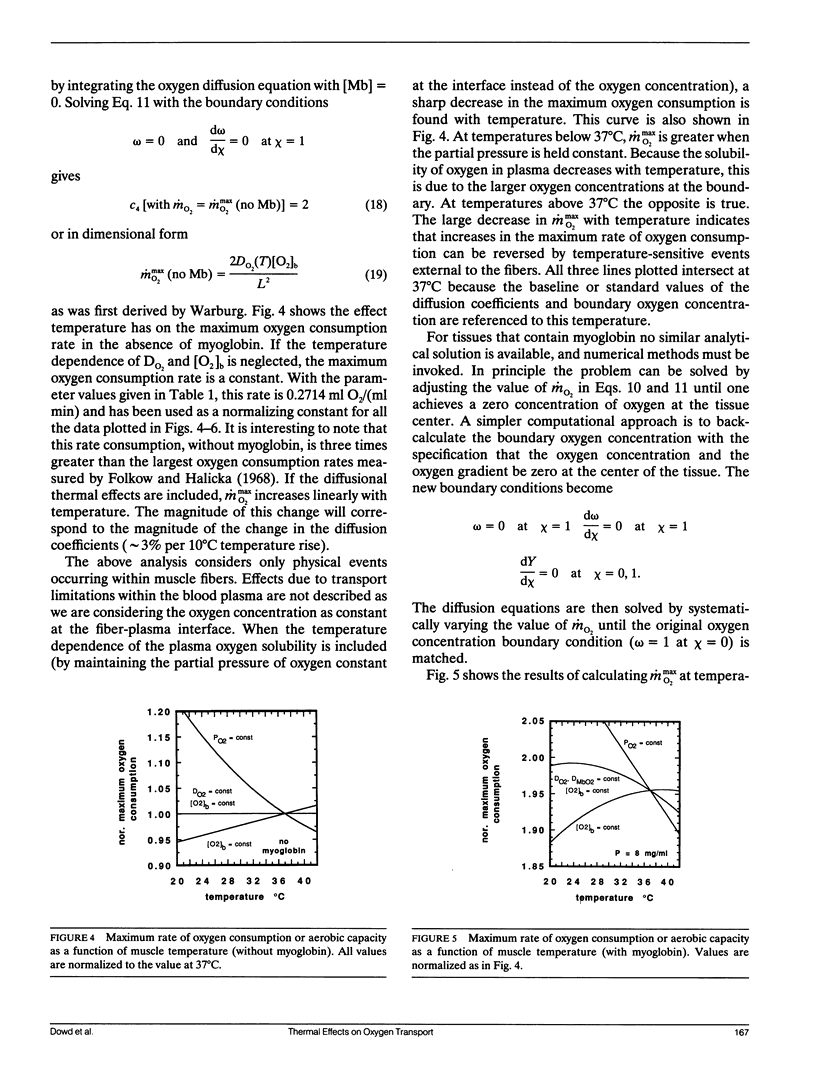
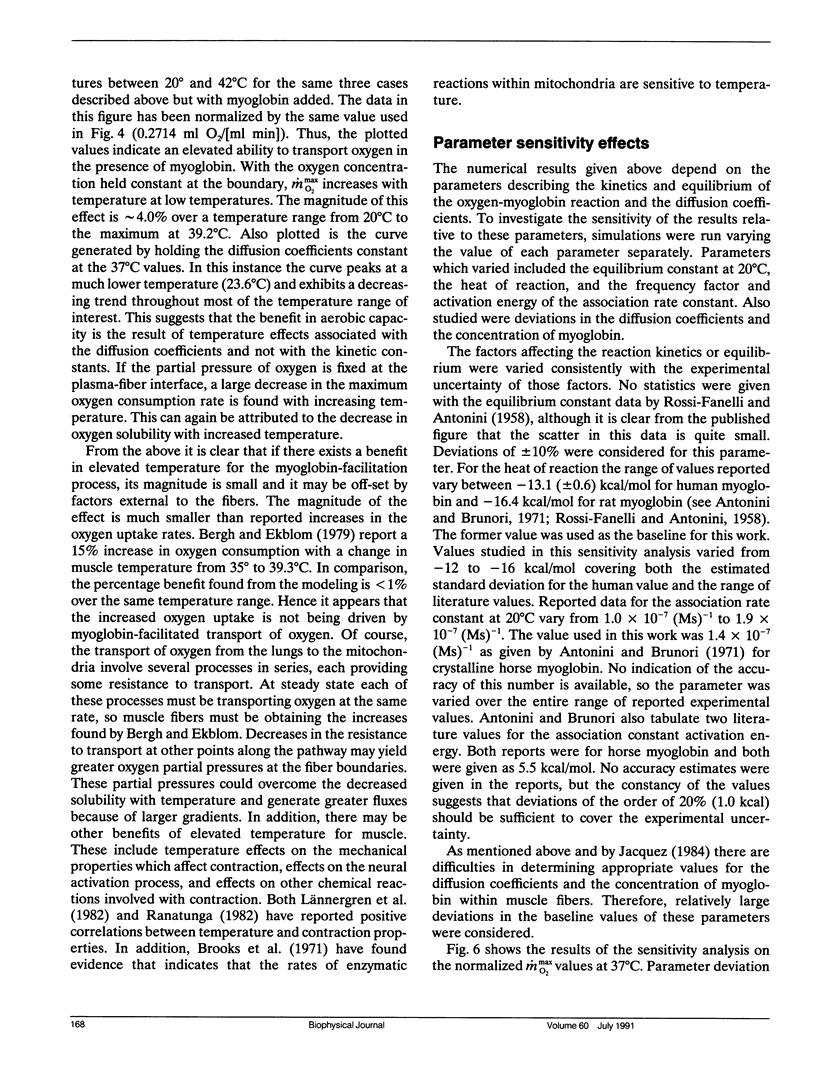
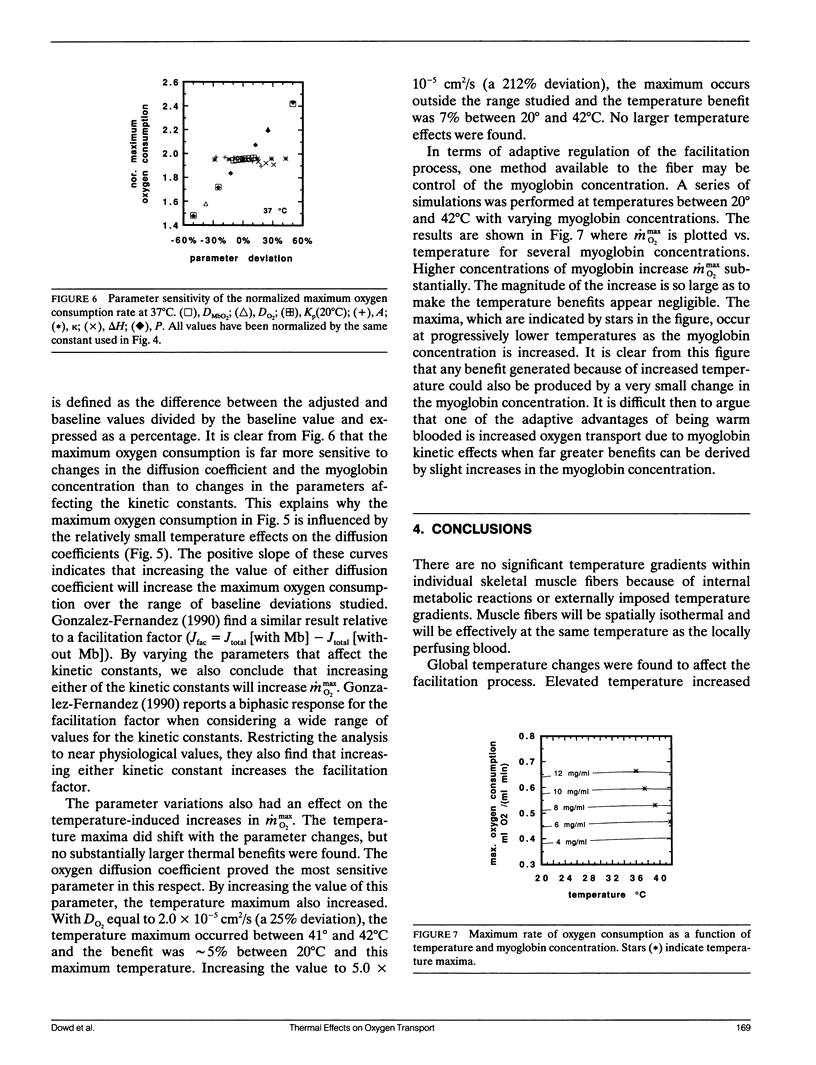
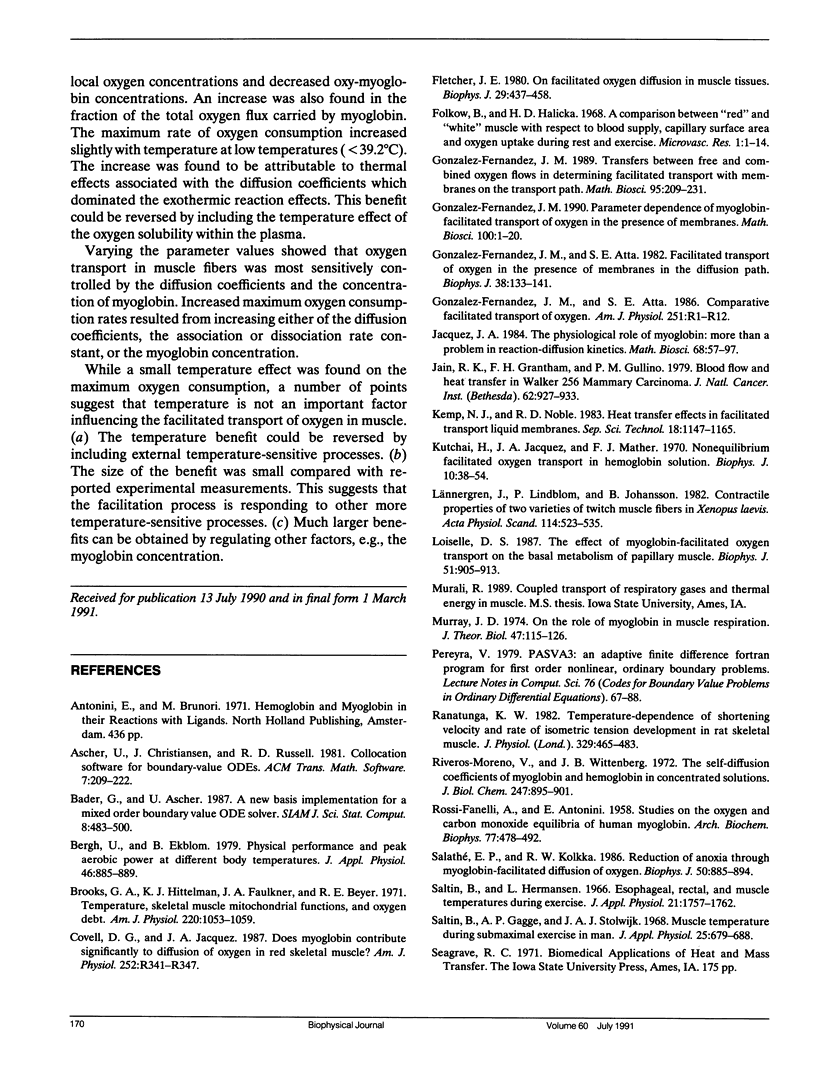
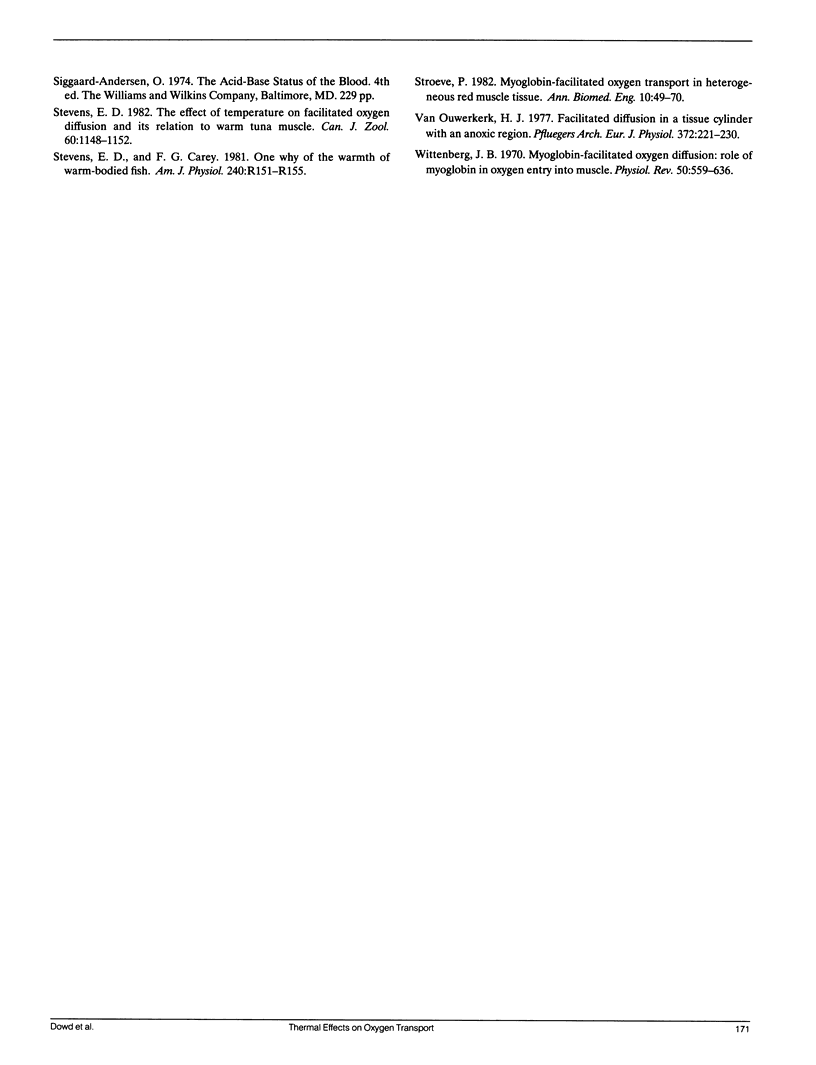
Selected References
These references are in PubMed. This may not be the complete list of references from this article.
- Bergh U., Ekblom B. Physical performance and peak aerobic power at different body temperatures. J Appl Physiol Respir Environ Exerc Physiol. 1979 May;46(5):885–889. doi: 10.1152/jappl.1979.46.5.885. [DOI] [PubMed] [Google Scholar]
- Brooks G. A., Hittelman K. J., Faulkner J. A., Beyer R. E. Temperature, skeletal muscle mitochondrial functions, and oxygen debt. Am J Physiol. 1971 Apr;220(4):1053–1059. doi: 10.1152/ajplegacy.1971.220.4.1053. [DOI] [PubMed] [Google Scholar]
- Covell D. G., Jacquez J. A. Does myoglobin contribute significantly to diffusion of oxygen in red skeletal muscle? Am J Physiol. 1987 Feb;252(2 Pt 2):R341–R347. doi: 10.1152/ajpregu.1987.252.2.R341. [DOI] [PubMed] [Google Scholar]
- Fletcher J. E. On facilitated oxygen diffusion in muscle tissues. Biophys J. 1980 Mar;29(3):437–458. doi: 10.1016/S0006-3495(80)85145-9. [DOI] [PMC free article] [PubMed] [Google Scholar]
- Gonzalez-Fernandez J. M., Atta S. E. Facilitated transport of oxygen in the presence of membranes in the diffusion path. Biophys J. 1982 May;38(2):133–141. doi: 10.1016/S0006-3495(82)84540-2. [DOI] [PMC free article] [PubMed] [Google Scholar]
- Gonzalez-Fernandez J. M. Parameter dependence of myoglobin-facilitated transport of oxygen in the presence of membranes. Math Biosci. 1990 Jun;100(1):1–20. doi: 10.1016/0025-5564(90)90044-y. [DOI] [PubMed] [Google Scholar]
- Gonzalez-Fernandez J. M. Transfers between free and combined oxygen flows in determining facilitated transport with membranes on the transport path. Math Biosci. 1989 Aug;95(2):209–231. doi: 10.1016/0025-5564(89)90034-5. [DOI] [PubMed] [Google Scholar]
- Jain R. K., Grantham F. H., Gullino P. M. Blood flow and heat transfer in Walker 256 mammary carcinoma. J Natl Cancer Inst. 1979 Apr;62(4):927–933. [PubMed] [Google Scholar]
- Kutchai H., Jacquez J. A., Mather F. J. Nonequilibrium facilitated oxygen transport in hemoglobin solution. Biophys J. 1970 Jan;10(1):38–54. doi: 10.1016/S0006-3495(70)86284-1. [DOI] [PMC free article] [PubMed] [Google Scholar]
- Loiselle D. S. The effect of myoglobin-facilitated oxygen transport on the basal metabolism of papillary muscle. Biophys J. 1987 Jun;51(6):905–913. doi: 10.1016/S0006-3495(87)83418-5. [DOI] [PMC free article] [PubMed] [Google Scholar]
- Lännergren J., Lindblom P., Johansson B. Contractile properties of two varieties of twitch muscle fibres in Xenopus laevis. Acta Physiol Scand. 1982 Apr;114(4):523–535. doi: 10.1111/j.1748-1716.1982.tb07020.x. [DOI] [PubMed] [Google Scholar]
- Murray J. D. On the role of myoglobin in muscle respiration. J Theor Biol. 1974 Sep;47(1):115–126. doi: 10.1016/0022-5193(74)90102-7. [DOI] [PubMed] [Google Scholar]
- ROSSI-FANELLI A., ANTONINI E. Studies on the oxygen and carbon monoxide equilibria of human myoglobin. Arch Biochem Biophys. 1958 Oct;77(2):478–492. doi: 10.1016/0003-9861(58)90094-8. [DOI] [PubMed] [Google Scholar]
- Ranatunga K. W. Temperature-dependence of shortening velocity and rate of isometric tension development in rat skeletal muscle. J Physiol. 1982 Aug;329:465–483. doi: 10.1113/jphysiol.1982.sp014314. [DOI] [PMC free article] [PubMed] [Google Scholar]
- Riveros-Moreno V., Wittenberg J. B. The self-diffusion coefficients of myoglobin and hemoglobin in concentrated solutions. J Biol Chem. 1972 Feb 10;247(3):895–901. [PubMed] [Google Scholar]
- Salathé E. P., Kolkka R. W. Reduction of anoxia through myoglobin-facilitated diffusion of oxygen. Biophys J. 1986 Nov;50(5):885–894. doi: 10.1016/S0006-3495(86)83529-9. [DOI] [PMC free article] [PubMed] [Google Scholar]
- Saltin B., Gagge A. P., Stolwijk J. A. Muscle temperature during submaximal exercise in man. J Appl Physiol. 1968 Dec;25(6):679–688. doi: 10.1152/jappl.1968.25.6.679. [DOI] [PubMed] [Google Scholar]
- Saltin B., Hermansen L. Esophageal, rectal, and muscle temperature during exercise. J Appl Physiol. 1966 Nov;21(6):1757–1762. doi: 10.1152/jappl.1966.21.6.1757. [DOI] [PubMed] [Google Scholar]
- Stevens E. D., Carey F. G. One why of the warmth of warm-bodied fish. Am J Physiol. 1981 Mar;240(3):R151–R155. doi: 10.1152/ajpregu.1981.240.3.R151. [DOI] [PubMed] [Google Scholar]
- Stroeve P. Myoglobin-facilitated oxygen transport in heterogeneous red muscle tissue. Ann Biomed Eng. 1982;10(2):49–70. doi: 10.1007/BF02366998. [DOI] [PubMed] [Google Scholar]
- Wittenberg J. B. Myoglobin-facilitated oxygen diffusion: role of myoglobin in oxygen entry into muscle. Physiol Rev. 1970 Oct;50(4):559–636. doi: 10.1152/physrev.1970.50.4.559. [DOI] [PubMed] [Google Scholar]
- van Ouwerkerk H. J. Facilitated diffusion in a tissue cylinder with an anoxic region. Pflugers Arch. 1977;372(3):221–230. doi: 10.1007/BF01063856. [DOI] [PubMed] [Google Scholar]


